欧亨利简介英文版
- 格式:ppt
- 大小:376.00 KB
- 文档页数:8
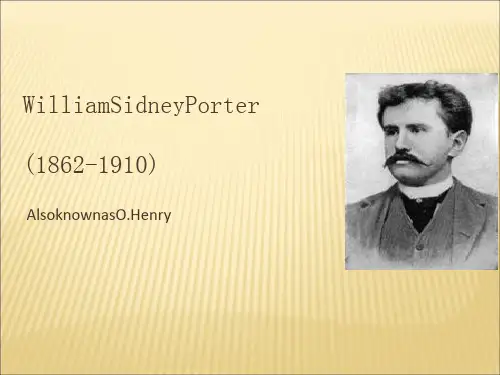
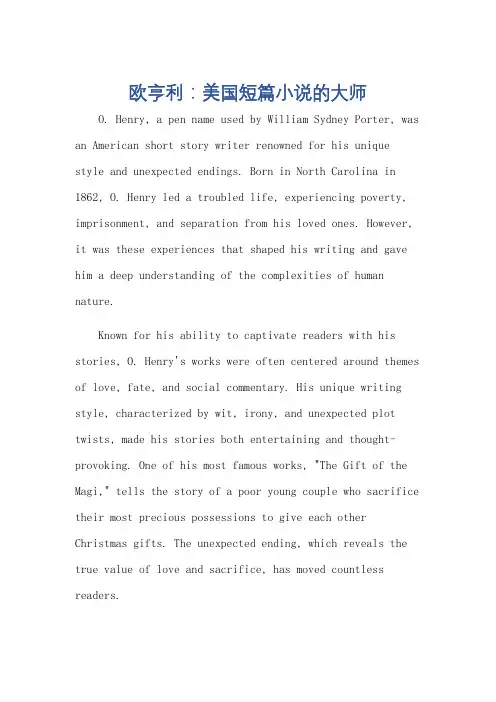
欧亨利:美国短篇小说的大师O. Henry, a pen name used by William Sydney Porter, was an American short story writer renowned for his uniquestyle and unexpected endings. Born in North Carolina in 1862, O. Henry led a troubled life, experiencing poverty, imprisonment, and separation from his loved ones. However, it was these experiences that shaped his writing and gave him a deep understanding of the complexities of human nature.Known for his ability to captivate readers with his stories, O. Henry's works were often centered around themes of love, fate, and social commentary. His unique writing style, characterized by wit, irony, and unexpected plot twists, made his stories both entertaining and thought-provoking. One of his most famous works, "The Gift of the Magi," tells the story of a poor young couple who sacrifice their most precious possessions to give each other Christmas gifts. The unexpected ending, which reveals the true value of love and sacrifice, has moved countless readers.O. Henry's stories were not just entertainment; they were also a reflection of the social issues of his time.His writing often criticized the injustices of society and the cruelty of fate. His characters, despite their misfortunes, often retained a sense of humor and hope that gave them strength to face their challenges. This optimismin the face of adversity is one of the hallmarks of O.Henry's writing.Despite his troubled life, O. Henry's legacy as awriter is timeless. His stories continue to be enjoyed by readers across the globe, who are captivated by his unique writing style and thought-provoking themes. His ability to capture the complexities of human nature and the essence of life in his stories makes him a timeless master of theshort story genre.**欧亨利:美国短篇小说的大师**欧亨利,原名威廉·西德尼·波特,是一位以笔名闻名的美国短篇小说作家,因其独特的风格和出人意料的结局而备受赞誉。
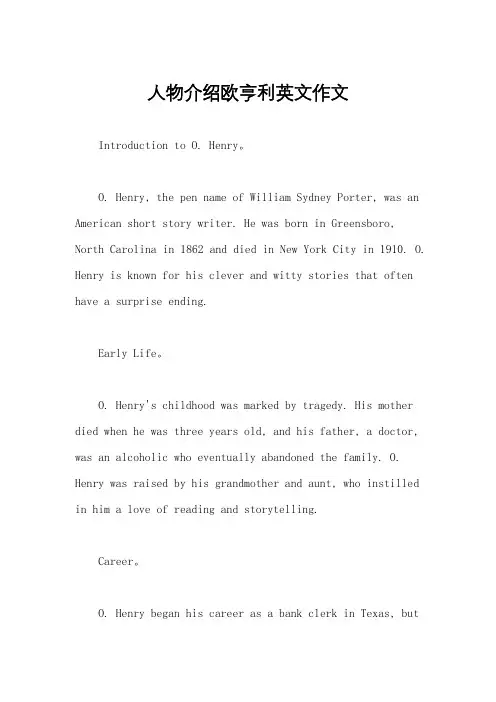
人物介绍欧亨利英文作文Introduction to O. Henry。
O. Henry, the pen name of William Sydney Porter, was an American short story writer. He was born in Greensboro, North Carolina in 1862 and died in New York City in 1910. O. Henry is known for his clever and witty stories that often have a surprise ending.Early Life。
O. Henry's childhood was marked by tragedy. His mother died when he was three years old, and his father, a doctor, was an alcoholic who eventually abandoned the family. O. Henry was raised by his grandmother and aunt, who instilled in him a love of reading and storytelling.Career。
O. Henry began his career as a bank clerk in Texas, buthe was accused of embezzlement and fled to Honduras to avoid prosecution. While in Honduras, he worked as a journalist and wrote his first stories. He returned to the United States in 1897 and began writing full-time.O. Henry's stories were published in magazines such as The Saturday Evening Post and McClure's Magazine. His first book, Cabbages and Kings, was published in 1904 and was a collection of stories set in the fictional Central American country of Anchuria. His most famous story, "The Gift of the Magi," was published in 1905 and is still widely read today.Style。
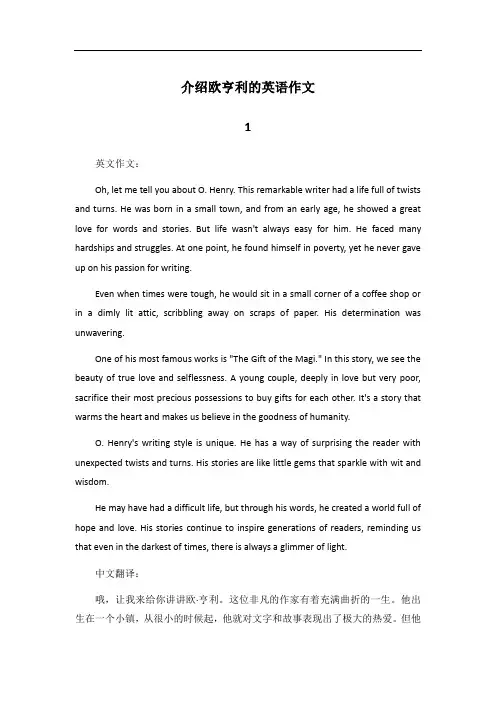
介绍欧亨利的英语作文1英文作文:Oh, let me tell you about O. Henry. This remarkable writer had a life full of twists and turns. He was born in a small town, and from an early age, he showed a great love for words and stories. But life wasn't always easy for him. He faced many hardships and struggles. At one point, he found himself in poverty, yet he never gave up on his passion for writing.Even when times were tough, he would sit in a small corner of a coffee shop or in a dimly lit attic, scribbling away on scraps of paper. His determination was unwavering.One of his most famous works is "The Gift of the Magi." In this story, we see the beauty of true love and selflessness. A young couple, deeply in love but very poor, sacrifice their most precious possessions to buy gifts for each other. It's a story that warms the heart and makes us believe in the goodness of humanity.O. Henry's writing style is unique. He has a way of surprising the reader with unexpected twists and turns. His stories are like little gems that sparkle with wit and wisdom.He may have had a difficult life, but through his words, he created a world full of hope and love. His stories continue to inspire generations of readers, reminding us that even in the darkest of times, there is always a glimmer of light.中文翻译:哦,让我来给你讲讲欧·亨利。
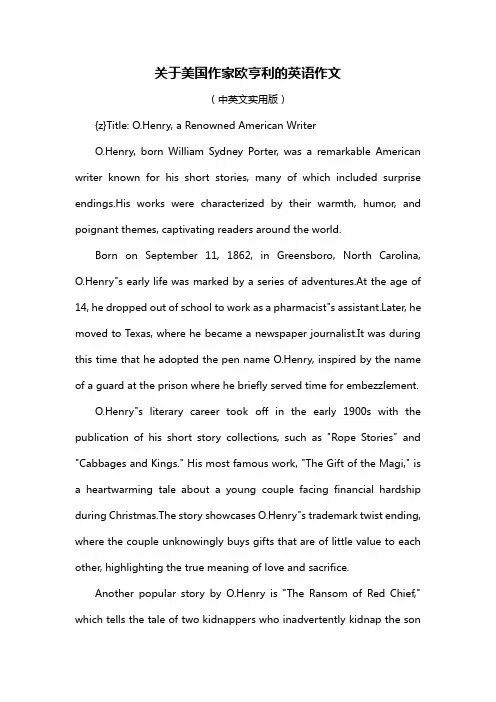
关于美国作家欧亨利的英语作文(中英文实用版){z}Title: O.Henry, a Renowned American WriterO.Henry, born William Sydney Porter, was a remarkable American writer known for his short stories, many of which included surprise endings.His works were characterized by their warmth, humor, and poignant themes, captivating readers around the world.Born on September 11, 1862, in Greensboro, North Carolina, O.Henry"s early life was marked by a series of adventures.At the age of 14, he dropped out of school to work as a pharmacist"s ter, he moved to Texas, where he became a newspaper journalist.It was during this time that he adopted the pen name O.Henry, inspired by the name of a guard at the prison where he briefly served time for embezzlement.O.Henry"s literary career took off in the early 1900s with the publication of his short story collections, such as "Rope Stories" and "Cabbages and Kings." His most famous work, "The Gift of the Magi," is a heartwarming tale about a young couple facing financial hardship during Christmas.The story showcases O.Henry"s trademark twist ending, where the couple unknowingly buys gifts that are of little value to each other, highlighting the true meaning of love and sacrifice.Another popular story by O.Henry is "The Ransom of Red Chief," which tells the tale of two kidnappers who inadvertently kidnap the sonof a wealthy businessman.The story is a humorous account of the kidnappers" attempts to ransom the boy, only to find themselves growing increasingly attached to him.O.Henry"s short stories often depicted the everyday lives of ordinary people, particularly those living in New York City"s Lower East Side.He humanized the struggles of the working class and immigrant communities, offering readers a glimpse into their triumphs and heartbreaks.Through his vivid characters and engaging storytelling, O.Henry remains a beloved figure in American literature.In recognition of his literary contributions, O.Henry was awarded the Pulitzer Prize for his collected works in 1916.He passed away on June 5, 1910, but his legacy lives on through his timeless stories that continue to delight readers generation after generation.In conclusion, O.Henry"s works are a testament to the power of storytelling and the human condition.His short stories, filled with humor, heartache, and surprise, have left an indelible mark on the literary world, making him a true American classic.。
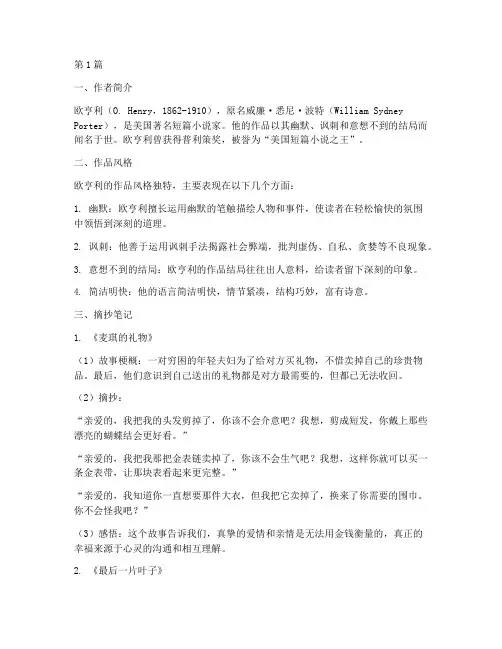
第1篇一、作者简介欧亨利(O. Henry,1862-1910),原名威廉·悉尼·波特(William Sydney Porter),是美国著名短篇小说家。
他的作品以其幽默、讽刺和意想不到的结局而闻名于世。
欧亨利曾获得普利策奖,被誉为“美国短篇小说之王”。
二、作品风格欧亨利的作品风格独特,主要表现在以下几个方面:1. 幽默:欧亨利擅长运用幽默的笔触描绘人物和事件,使读者在轻松愉快的氛围中领悟到深刻的道理。
2. 讽刺:他善于运用讽刺手法揭露社会弊端,批判虚伪、自私、贪婪等不良现象。
3. 意想不到的结局:欧亨利的作品结局往往出人意料,给读者留下深刻的印象。
4. 简洁明快:他的语言简洁明快,情节紧凑,结构巧妙,富有诗意。
三、摘抄笔记1. 《麦琪的礼物》(1)故事梗概:一对穷困的年轻夫妇为了给对方买礼物,不惜卖掉自己的珍贵物品。
最后,他们意识到自己送出的礼物都是对方最需要的,但都已无法收回。
(2)摘抄:“亲爱的,我把我的头发剪掉了,你该不会介意吧?我想,剪成短发,你戴上那些漂亮的蝴蝶结会更好看。
”“亲爱的,我把我那把金表链卖掉了,你该不会生气吧?我想,这样你就可以买一条金表带,让那块表看起来更完整。
”“亲爱的,我知道你一直想要那件大衣,但我把它卖掉了,换来了你需要的围巾。
你不会怪我吧?”(3)感悟:这个故事告诉我们,真挚的爱情和亲情是无法用金钱衡量的,真正的幸福来源于心灵的沟通和相互理解。
2. 《最后一片叶子》(1)故事梗概:一位年轻画家为了鼓励一位病重的老画家,不惜冒着生命危险,画下了最后一片叶子,让老画家重拾生活的信心。
(2)摘抄:“我知道,我知道,你是在安慰我,但我真的觉得这叶子是我的希望。
它就像是我心中的那份信念,只要它还在,我就有希望。
”(3)感悟:这个故事告诉我们,信念和希望是战胜困难、走出困境的力量源泉。
3. 《警察与赞美诗》(1)故事梗概:一位穷困潦倒的男子为了逃避警察的追捕,故意犯罪,最终被警察抓住。
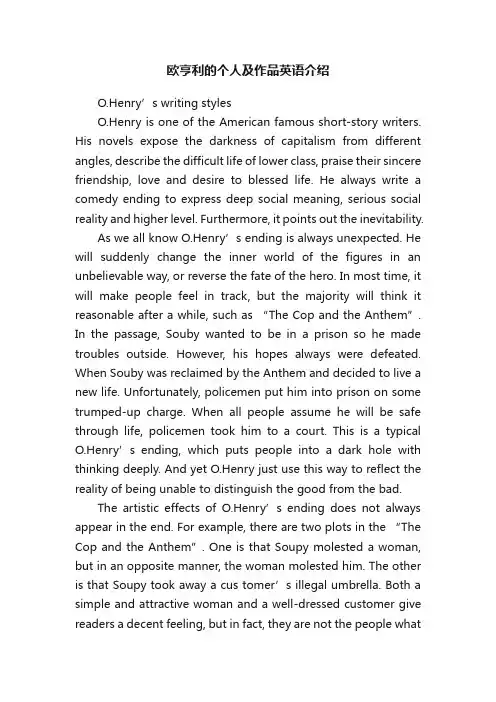
欧亨利的个人及作品英语介绍O.Henry’s writing stylesO.Henry is one of the American famous short-story writers. His novels expose the darkness of capitalism from different angles, describe the difficult life of lower class, praise their sincere friendship, love and desire to blessed life. He always write a comedy ending to express deep social meaning, serious social reality and higher level. Furthermore, it points out the inevitability.As we al l know O.Henry’s ending is always unexpected. He will suddenly change the inner world of the figures in an unbelievable way, or reverse the fate of the hero. In most time, it will make people feel in track, but the majority will think it reasonable after a while, such as “The Cop and the Anthem”. In the passage, Souby wanted to be in a prison so he made troubles outside. However, his hopes always were defeated. When Souby was reclaimed by the Anthem and decided to live a new life. Unfortunately, policemen put him into prison on some trumped-up charge. When all people assume he will be safe through life, policemen took him to a court. This is a typical O.Henry’s ending, which puts people into a dark hole with thinking deeply. And yet O.Henry just use this way to reflect the reality of being unable to distinguish the good from the bad.The artistic effects of O.Henry’s ending does not always appear in the end. For example, there are two plots in the “The Cop and the Anthem”. One is that Soupy molested a woman, but in an opposite manner, the woman molested him. The other is that Soupy took away a cus tomer’s illegal umbrella. Both a simple and attractive woman and a well-dressed customer give readers a decent feeling, but in fact, they are not the people whatwe are thinking. I believer everyone will think it is incredible like me. Only if we think carefully is it normal. After all, those people really exist in our society. Is everyone in upper-class noble, kind and well-behaved? Of course not, someone just put their dirty behaviors under their beautiful mask. In order to express the inner dirtiness, O.Henry had to decorate a lot in the passage. Although what it is isn’t as how it is, in short, it is reasonable. O.Henry’s ending exposed the public morals going from bad to worse of capitalism in the humors.。

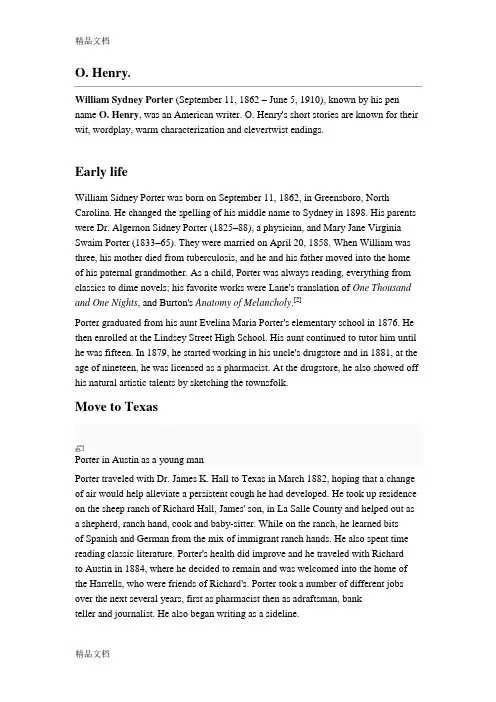
O. Henry.William Sydney Porter (September 11, 1862 – June 5, 1910), known by his pen name O. Henry, was an American writer. O. Henry's short stories are known for their wit, wordplay, warm characterization and clevertwist endings.Early lifeWilliam Sidney Porter was born on September 11, 1862, in Greensboro, North Carolina. He changed the spelling of his middle name to Sydney in 1898. His parents were Dr. Algernon Sidney Porter (1825–88), a physician, and Mary Jane Virginia Swaim Porter (1833–65). They were married on April 20, 1858. When William was three, his mother died from tuberculosis, and he and his father moved into the home of his paternal grandmother. As a child, Porter was always reading, everything from classics to dime novels; his favorite works were Lane's translation of One Thousand and One Nights, and Burton's Anatomy of Melancholy.[2]Porter graduated from his aunt Evelina Maria Porter's elementary school in 1876. He then enrolled at the Lindsey Street High School. His aunt continued to tutor him until he was fifteen. In 1879, he started working in his uncle's drugstore and in 1881, at the age of nineteen, he was licensed as a pharmacist. At the drugstore, he also showed off his natural artistic talents by sketching the townsfolk.Move to TexasPorter in Austin as a young manPorter traveled with Dr. James K. Hall to Texas in March 1882, hoping that a change of air would help alleviate a persistent cough he had developed. He took up residence on the sheep ranch of Richard Hall, James' son, in La Salle County and helped out as a shepherd, ranch hand, cook and baby-sitter. While on the ranch, he learned bitsof Spanish and German from the mix of immigrant ranch hands. He also spent time reading classic literature. Porter's health did improve and he traveled with Richardto Austin in 1884, where he decided to remain and was welcomed into the home of the Harrells, who were friends of Richard's. Porter took a number of different jobs over the next several years, first as pharmacist then as adraftsman, bankteller and journalist. He also began writing as a sideline.Porter led an active social life in Austin, including membership in singing and drama groups. He was a good singer and musician. He played both the guitar andmandolin. He became a member of the "Hill City Quartet," a group of young men who sang at gatherings and serenaded young women of the town. Porter met and begancourting Athol Estes, then seventeen years old and from a wealthy family. Her mother objected to the match because Athol was ill, suffering from tuberculosis. On July 1, 1887, Porter eloped with Athol to the home of Reverend R. K. Smoot, where they were married.Porter family in early 1890s—Athol, daughter Margaret, WilliamThe couple continued to participate in musical and theater groups, and Athol encouraged her husband to pursue his writing. Athol gave birth to a son in 1888, who died hours after birth, and then a daughter, Margaret Worth Porter, in September 1889. Porter's friend Richard Hall became Texas Land Commissioner and offered Porter a job. Porter started as a draftsman at the Texas General Land Office (GLO) in 1887 at a salary of $100 a month, drawing maps from surveys andfield notes. The salary was enough to support his family, but he continued his contributions to magazines and newspapers.Porter as a clerk at the First National Bank, AustinIn the GLO building, he began developing characters and plots for such stories as "Georgia's Ruling" (1900), and "Buried Treasure" (1908). The castle-like building he worked in was even woven into some of his tales such as "Bexar Scrip No. 2692" (1894).His job at the GLO was a political appointment by Hall. Hall ran for governor in the election of 1890 but lost. Porter resigned in early 1891 when the new governor, Jim Hogg, was sworn in.The same year, Porter began working at the First National Bank of Austin as a teller and bookkeeper at the same salary he had made at the GLO. The bank was operated informally and Porter was apparently careless in keeping his books and may have embezzled funds. In 1894, he was accused by the bank of embezzlement and lost his job but was not indicted.He then worked full-time on his humorous weekly called The Rolling Stone, which he started while working at the bank. The Rolling Stone featured satire on life, peopleand politics and included Porter's short stories and sketches. Although eventually reaching a top circulation of 1500, The Rolling Stone failed in April 1895 since the paper never provided an adequate income. However, his writing and drawings had caught the attention of the editor at the Houston Post.Porter and his family moved to Houston in 1895, where he started writing for the Post. His salary was only $25 a month, but it rose steadily as his popularity increased. Porter gathered ideas for his column by loitering in hotel lobbies and observing and talking to people there. This was a technique he used throughout his writing career.While he was in Houston, the First National Bank of Austin was audited by federal auditors and they found the embezzlement shortages that had led to his firing. A federal indictment followed and he was arrested on charges of embezzlement.Flight and returnPorter in his 30sPorter's father-in-law posted bail to keep him out of jail. He was due to stand trial on July 7, 1896, but the day before, as he was changing trains to get to the courthouse, an impulse hit him. He fled, first to New Orleansand later to Honduras. While holed upin a Trujillo hotel for several months, he wrote Cabbages and Kings, in which he coined the term "banana republic" to describe the country, a phrase subsequently used widely to describe a small, unstable tropical nation in Latin America with a narrowly focused, agrarian economy.[3] Porter had sent Athol and Margaret back to Austin to live with Athol's parents. Unfortunately, Athol became too ill to meet Porter in Honduras as Porter had planned. When he learned that his wife was dying, Porter returned to Austin in February 1897 and surrendered to the court, pending an appeal. Once again, Porter's father-in-law posted bail so Porter could stay with Athol and Margaret.Athol Estes Porter died on July 25, 1897, from tuberculosis (then known as consumption). Porter, having little to say in his own defense, was found guilty of embezzlement in February 1898, sentenced to five years in prison, and imprisoned on March 25, 1898 at the Ohio Penitentiary in Columbus, Ohio. While in prison, Porter, as a licensed pharmacist, worked in the prison hospital as the night druggist. Porter was given his own room in the hospital wing, and there is no record that he actually spent time in the cell block of the prison. He had fourteen stories published under various pseudonyms while he was in prison, but was becoming best known as "O. Henry", a pseudonym that first appeared over the story "Whistling Dick's ChristmasStocking" in the December 1899 issue of McClure's Magazine. A friend of his in New Orleans would forward his stories to publishers, so they had no idea the writer was imprisoned. Porter was released on July 24, 1901, for good behavior after serving three years. Porter reunited with his daughter Margaret, now age 11, in Pittsburgh, Pennsylvania, where Athol's parents had moved after Porter's conviction. Margaret was never told that her father had been in prison—just that he had been away on business.Later lifePorter's most prolific writing period started in 1902, when he moved to New York City to be near his publishers. While there, he wrote 381 short stories. He wrote a story a week for over a year for the New York World Sunday Magazine. His wit, characterization, and plot twists were adored by his readers, but often panned by critics. Porter married again in 1907, to childhood sweetheart Sarah (Sallie) Lindsey Coleman, whom he met again after revisiting his native state of North Carolina.Porter was a heavy drinker, and his health deteriorated markedly in 1908, which affected his writing. In 1909, Sarah left him, and he died on June 5, 1910, of cirrhosis of the liver, complications of diabetes, and anenlarged heart. After funeral services in New York City, he was buried in the Riverside Cemetery in Asheville, North Carolina. His daughter, Margaret Worth Porter, who died in 1927, was buried next to her father.StoriesPortrait of Porter from frontispiece in his collection of short stories Waifs and Strays O. Henry's stories frequently have surprise endings. In his day, he was called the American answer to Guy de Maupassant. Both authors wrote plot twist endings, but O. Henry stories were much more playful. His stories are also known for witty narration. Most of O. Henry's stories are set in his own time, the early 20th century. Many take place in New York City and deal for the most part with ordinary people: clerks, policemen, waitresses, etc.O. Henry's work is wide-ranging, and his characters can be found roaming thecattle-lands of Texas, exploring the art of the con-man, or investigating the tensions of class and wealth in turn-of-the-century New York. O. Henry had an inimitable hand for isolating some element of society and describing it with an incredible economy and grace of language. Some of his best and least-known work is containedin Cabbages and Kings, a series of stories each of which explores some individual aspect of life in a paralytically sleepy Central American town, while advancing some aspect of the larger plot and relating back one to another.Cabbages and Kings was his first collection of stories, followed by The Four Million. The second collection opens with a reference to Ward McAllister's "assertion that there were only 'Four Hundred' people in New York City who were really worth noticing. But a wiser man has arisen—the census taker—and his larger estimate of human interest has been preferred in marking out the field of these little stories of the 'Four Million.'" To O. Henry, everyone in New York counted.He had an obvious affection for the city, which he called"Bagdad-on-the-Subway,"[4] and many of his stories are set there—while others are set in small towns or in other cities.Among his most famous stories are:•"The Gift of the Magi" about a young couple who are short of money but desperately want to buy each other Christmas gifts. Unbeknownst to Jim, Della sells her most valuable possession, her beautiful hair, in order to buy a platinum fob chain for Jim's watch; while unbeknownst to Della, Jim sells his own most valuable possession, his watch, to buy jeweled combs for Della's hair. Theessential premise of this story has been copied, re-worked, parodied, andotherwise re-told countless times in the century since it was written.••"The Ransom of Red Chief", in which two men kidnap a boy of ten. The boy turns out to be so bratty and obnoxious that the desperate men ultimately pay the boy's father $250 to take him back.•"The Cop and the Anthem" about a New York City hobo named Soapy, who sets out to get arrested so that he can be a guest of the city jail instead of sleeping out in the cold winter. Despite efforts at petty theft, vandalism, disorderly conduct, and "mashing" with a young prostitute, Soapy fails to draw the attention of the police. Disconsolate, he pauses in front of a church, where an organ antheminspires him to clean up his life—and is ironically charged for loitering andsentenced to three months in prison.••"A Retrieved Reformation", which tells the tale of safecracker Jimmy Valentine, recently freed from prison. He goes to a town bank to case it before he robs it. As he walks to the door, he catches the eye of the banker's beautifuldaughter. They immediately fall in love and Valentine decides to give up hiscriminal career. He moves into the town, taking up the identity of Ralph Spencer,a shoemaker. Just as he is about to leave to deliver his specialized tools to an oldassociate, a lawman who recognizes him arrives at the bank. Jimmy and hisfiancée and her family are at the bank, inspecting a new safe, when a childaccidentally gets locked inside the airtight vault. Knowing it will seal his fate,Valentine opens the safe to rescue the child. However, much to Valentine'ssurprise, the lawman denies recognizing him and lets him go.••"The Duplicity of Hargraves". A short story about a nearly destitute father and daughter's trip to Washington, D.C.Pen namePorter gave various explanations for the origin of his pen name.[5] In 1909 he gave an interview to The New York Times, in which he gave an account of it:It was during these New Orleans days that I adopted my pen name of O. Henry.I said to a friend: "I'm going to send out some stuff. I don't know if it amountsto much, so I want to get a literary alias. Help me pick out a good one." Hesuggested that we get a newspaper and pick a name from the first list ofnotables that we found in it. In the society columns we found the account of afashionable ball. "Here we have our notables," said he. We looked down thelist and my eye lighted on the name Henry, "That'll do for a last name," said I."Now for a first name. I want something short. None of your three-syllablenames for me." "Why don’t you use a plain initial letter, then?" asked myfriend. "Good," said I, "O is about the easiest letter written, and O it is."A newspaper once wrote and asked me what the O stands for. I replied, "Ostands for Olivier, the French for Oliver." And several of my storiesaccordingly appeared in that paper under the name Olivier Henry.[6] In the introduction to The World of O. Henry: Roads of Destiny and OtherStories (Hodder & Stoughton, 1973),William Trevor writes that when Porter was in the Ohio State Penitentiary "there was a prison guard named Orrin Henry,whom William Sydney Porter . . . immortalised as O. Henry".The writer and scholar Guy Davenport offers another explanation: "[T]he pseudonym that he began to write under in prison is constructed from the first two letters of Oh io and the second and last two of p en itentia ry [bold added]."[5]LegacyThe O. Henry Award is a prestigious annual prize named after Porter and given to outstanding short stories. Several schools around the country bear Porter's pseudonym.In 1952, a film featuring five stories, called O. Henry's Full House, was made. The episode garnering the most critical acclaim[citation needed] was "The Cop and the Anthem" starring Charles Laughton and Marilyn Monroe. The other stories are "The Clarion Call", "The Last Leaf", "The Ransom of Red Chief" (starring Fred Allen and Oscar Levant), and "The Gift of the Magi".The O. Henry House and O. Henry Hall, both in Austin, Texas, are named for him. O. Henry Hall, now owned by the University of Texas, previously served as the federal courthouse in which O. Henry was convicted of embezzlement.Porter has elementary schools named for him in Greensboro, NorthCarolina (William Sydney Porter Elementary[7]) and Garland, Texas (O. Henry Elementary), as well as a middle school in Austin, Texas (O. Henry Middle School[8]). The O. Henry Hotel in Greensboro is also named for Porter.On September 11, 2012, the U.S. Postal Service issued a stamp commemorating the 150th anniversary of O. Henry's birth.[9]Bid for posthumous pardonOn November 23, 2011, Barack Obama quoted O. Henry while granting pardons to two turkeys named Liberty and Peace.[10] In response, political science professor P. S. Ruckman, Jr., and Texas attorney Scott Henson filed a formal application for a posthumous pardon in September of 2012, the same month the U.S. Postal Service issued its O. Henry stamp.[11] Previous attempts were made to obtain such a pardon for Porter in the administrations of Woodrow Wilson, Dwight Eisenhower and Ronald Reagan,[12] but no one had ever bothered to file a formal application.[13] Ruckman and Henson argued that Porter deserved a pardonbecause (1) he was a law-abiding citizen previous to his conviction, (2) his offense was minor, (3) he had an exemplary prison record, (4) his post-prison life clearly indicated rehabilitation, (5) he would have been an excellent candidate for clemency in his time, had he but applied for pardon, (6) by today's standards he remains an excellent candidate for clemency, and (7) his pardon would be awell-deserved symbolic gesture and more.[11]。
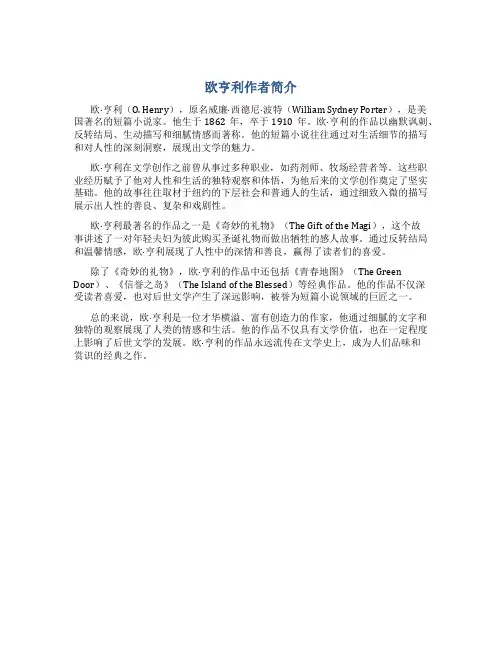
欧亨利作者简介
欧·亨利(O. Henry),原名威廉·西德尼·波特(William Sydney Porter),是美国著名的短篇小说家。
他生于1862年,卒于1910年。
欧·亨利的作品以幽默讽刺、反转结局、生动描写和细腻情感而著称。
他的短篇小说往往通过对生活细节的描写和对人性的深刻洞察,展现出文学的魅力。
欧·亨利在文学创作之前曾从事过多种职业,如药剂师、牧场经营者等。
这些职业经历赋予了他对人性和生活的独特观察和体悟,为他后来的文学创作奠定了坚实基础。
他的故事往往取材于纽约的下层社会和普通人的生活,通过细致入微的描写展示出人性的善良、复杂和戏剧性。
欧·亨利最著名的作品之一是《奇妙的礼物》(The Gift of the Magi),这个故
事讲述了一对年轻夫妇为彼此购买圣诞礼物而做出牺牲的感人故事。
通过反转结局和温馨情感,欧·亨利展现了人性中的深情和善良,赢得了读者们的喜爱。
除了《奇妙的礼物》,欧·亨利的作品中还包括《青春地图》(The Green Door)、《信誉之岛》(The Island of the Blessed)等经典作品。
他的作品不仅深
受读者喜爱,也对后世文学产生了深远影响,被誉为短篇小说领域的巨匠之一。
总的来说,欧·亨利是一位才华横溢、富有创造力的作家,他通过细腻的文字和独特的观察展现了人类的情感和生活。
他的作品不仅具有文学价值,也在一定程度上影响了后世文学的发展。
欧·亨利的作品永远流传在文学史上,成为人们品味和
赏识的经典之作。

欧亨利简介(Ohenry introduction)O Henry (O Henry, 1862 ~ 1910), formerly known as William Sidney Porter (WilliamsydneyPorter), is one of the most famous American novelist, was praised by critics as Manhattan crown prose writer and the father of modern American short stories. He was born in Greensboro, North Carolina town of a family physician. His life is rich in the legend, the pharmacy apprentice cattle people, accountants and Land Bureau clerk, journalists, bank teller. When the bank teller, because the bank shortage of cash, in order to avoid interrogation, left home in exile in Honduras, China and america. Jailed for visiting his critically ill wife, he was jailed and served as a pharmacist in the prison clinic. When he worked in the bank, he had written experience and worked as a pharmacist in the prison clinic and began to write seriously. Prior to his release in 1901, he moved to New York to specialize in writing.O Henry is good at depicting American society, especially the life of the people in New York. His works are novel, humorous, and often end upset; because described many characters, full of life, known as the "Encyclopedia of American life humor". Representative works are novels, Chinese cabbage and king, four million, the road to destiny and so on. Some masterpieces such as "love sacrifice", "police and hymn", "furnished rooms", "gift of the Magi", "the last leaf" earned him a reputation in the world.Style IntroductionMention of O Henry's novels, people always used to describe his style of "laugh with tears, but think about those who lived ahumble, poor, helpless life of the little people, o. Henry in the novel will feel, if in such a situation," tearful "of course is easy, but how to laugh? But in O Henry's novels is haunted by a kind of sad mood, but not a hint of joy and hope. Even in the desperate situation where people can also find out the absurdity of life, to find humor in the helpless, sad experience in poetry, as the dark material is dotted with flowers, there is a hope, a comfort, a warm, life is beautiful, you can let them ride out the day after day, until destined end. And the end of this novel is created by O Henry himself. He always makes the most agreeable arrangements in the most unexpected way. Sometimes, this kind of fulfillment will make the former misfortune roses, and make the hardship become romantic, which makes people not sure that there is such a thing, but it must be the most promising thing.O Henry's writing has a profound basis in life. He should have a profound experience for misfortune. He lost his mother when he was young, and he was a genius in painting, but he had no way to develop. A famous male school says that as long as he draws school, he is admitted to school, free of tuition and free from board and lodging. He who has a passion for literature and art must be eager to be educated, but he can not do it. He has no book fees and installation fees, and he has to earn a living to support himself. His life is as an apprentice in a pharmacy, in West Texas cattle, do accounting, cartographer, reporter. Life requires much of him, but little grace, almost nothing. From his works can be seen in the pharmacist's knowledge and the local customs and practices but in addition to his aunt, the early enlightenment education he own education themselves, whether learning or life is helpless, in addition to the painno other favorable factors become a novelist, but he finally became a writer, he can imagine how experienced struggle. When he was a teller, he used to be absent-minded and painted at work, but he bought a magazine, published some works, and began his original literary creation. But there is a greater misfortune waiting for him, he suspected of corruption, but also to the Latin American asylum, back and ill wife goodbye, and jailed. The parting sorrow pain and loss of freedom enough to make anyone lose hope,But he began writing in prison and became famous ever since. His experience confirms the life he describes in his novels: there is hope in trouble, and life becomes warmer than before. But it must go through a process, as the winter to spring, the seed age people will not predict the flower appearance, only after the burial through patience, there will be a surprise, there will be fresh, beautiful days, can make the former bitter is sweet. However, some people think that O Henry's plot is not conducive to literary realism and influence the depth of his works. Golgi said: "your life is very bitter, but a woman may marry a millionaire, a man may marry a wealthy woman, or to find what other things. The characters in O Henry's novels is not only for the revolution for a decent life, but they are always kind, passionate, even not strong and never play tricks, so in any case they still cute.O Henry's novel is very delicate in structure, and uses the art that other people have never used. This is the famous "euro Henry" ending. In the novel, O Henry is always on the one hand to describe things, people began to think think what arrangements, but the real ending clues generally hidden in theseemingly dull narrative, even if O Henry is good at predicting a surprise, rarely able to guess how things could be perfectly logical and reasonable but beyond the imagination. Each of O Henry's novels uses the same technique, but each has the same charm, and it seems that his knitting skills for world joys and sorrows are endless. And each ending brings new meaning to the preceding plot, leaving a lasting and profound ambiguity. But that means too vast, so some people think that the work structure more features than the characters in O Henry's novels, a deep impression left is indeed the mood and plot, instead of characters and character, but in any case, the limited tenderness lonely helpless in tenderness and miracles that touched us deeply, so we find hope and comfort.O Henry was also a master of humor. He was good at finding seeds of humor and cultivating them to make strange flowers. However, when people enjoy a exotic flower, not a flower to be luxury, this kind of pressure makes o. Henry more carefully combing life, so that friends are afraid of him, he also said: "I almost become a humorous materials thief.There are altogether more than 300 short stories written by O Henry. The main novels are "four million", "the heart of the west", "voice of the city", "good"。
欧亨利英文介绍作文下载温馨提示:该文档是我店铺精心编制而成,希望大家下载以后,能够帮助大家解决实际的问题。
文档下载后可定制随意修改,请根据实际需要进行相应的调整和使用,谢谢!并且,本店铺为大家提供各种各样类型的实用资料,如教育随笔、日记赏析、句子摘抄、古诗大全、经典美文、话题作文、工作总结、词语解析、文案摘录、其他资料等等,如想了解不同资料格式和写法,敬请关注!Download tips: This document is carefully compiled by theeditor. I hope that after you download them,they can help yousolve practical problems. The document can be customized andmodified after downloading,please adjust and use it according toactual needs, thank you!In addition, our shop provides you with various types ofpractical materials,such as educational essays, diaryappreciation,sentence excerpts,ancient poems,classic articles,topic composition,work summary,word parsing,copyexcerpts,other materials and so on,want to know different data formats andwriting methods,please pay attention!O. Henry is a famous American writer. His stories are full of surprises and twists.He has a unique writing style that makes his works very interesting.Many of his stories are about ordinary people and their lives.His endings are often unexpected, which makes readers remember his works.O. Henry's influence on literature is undeniable.。
欧亨利的英文简介欧·亨利,美国现代短篇小说创始人,曾被评论界誉为曼哈顿桂冠散文作家和美国现代短篇小说之父,下面是店铺为你整理的欧亨利的英文简介,希望对你有用!欧·亨利简介O Henry (1825-1911), also translated Austrian Henry, formerly known as William Sidney Porter, American short novelist, founder of the American modern short story, its main works are "Maggie's gift "," Police and hymn "," last leaf "," twenty years later "and so on.September 11, 1862, Henry Henry was born in the United States North Carolina Greensboro, has worked as a bank clerk, pharmacists and so on. In February 1896, Ou Henry was imprisoned for allegations of misappropriation of public funds and fled to Honduras. In 1898 again in prison, began to publish works. In 1902, Henry Henry moved to New York to become a professional writer. On June 5, 1910, O Henry died of liver cirrhosis in New York. Ou Henry and Chekhov and Maupassan tied the world's three major short stories, has been criticized as the Manhattan laurel prose writer and the father of modern American short stories, his works are "American life encyclopedia" reputation.欧·亨利人物经历September 11, 1862, Henry Henry was born in the United States North Carolina Greensboro, formerly known as William Sidney Porter.In 1865, when Henry Henry was three years old, his mother died of tuberculosis. In the same year, he and his father moved to his grandmother's house to live, and he was sent to a privateschool run by his brother. He was later raised by his grandmother and aunt, and his aunt inspired his love for literature.In 1876, Henry Henry graduated from aunt's private school. Then he went to high school to study, but was forced to drop out of school in 1877, to his uncle's pharmacy for five years apprentice. Juvenile Henry Henry likes to paint, and quite talent, he was young when they wanted to be a painter.In March 1882, a doctor named James K. Hall of Greensboro saw that Henry Henry was in a bad condition and took him to a sheep farm in Lassalle County, Texas. Henry Henry liked the life of the western ranch, where he lived for two years. He sometimes helps to do the shepherd, the chef, the baby caregiver, and learn from some immigrants for some time in Spanish and German.In 1884, Henry Henry came to Austin, living in a fellow home, and in Austin to find a job. Henry Henry has changed the living conditions of the poor by singers, dramatists, pharmacists, draftsmen, journalists and tellers. Western life inspired his humorous cells, and became an important material for his later short stories. He changed his ambition at the age of 21 and decided to become a writer.In 1887, Henry Henry and Aosol Estes (married to Aso Porter) married, the same year in the "Detroit free press and real" published works.In 1891, Henry Henry came to Austin First National Bank as a cashier.In 1894, Henry Henry spent $ 250 to buy Austin's weekly magazine, renamed it "Rolling Stone", making it a humorous magazine. He is both editors and publishers, write their own articles, painting their own. In October the same year, the federal bank inspector found that the account of Europe Henry hadproblems, he had to resign.In April 1895, a year after the editor of the Rolling Stones, the magazine failed completely, so that Henry Henry returned the magazine to the original. Then they moved to Houston, where Henry Henry went to the "Houston Post" as a journalist and columnist.In February 1896, Euro Henry was prosecuted for misappropriation of public funds, passed the trial and was temporarily held. His father-in-law will be released from prison. Originally, Henry Henry's case was not serious, but he fled to New Orleans on the day before the summons (July 7, 1896) and then fled to Honduras. He spent several months at the hotel in Tegucigalpa. He learned to help him in his early years, and he began writing novels "cabbage and kings" in Honduras.In February 1897, O Henry was informed that his wife suffering from tuberculosis was in critical condition and returned to Austin. He was arrested immediately after returning home, but soon again by father-in-law released from prison. On July 25, his wife, Aso Porter, died of tuberculosis.In February 1898, Ou Henry was convicted and sentenced to five years in prison. On 25 March, he commenced his sentence in federal prison in Columbus, Ohio. During his sentence, O. Henry was a prisoner, and in order to maintain his daughter and his life, and for her daughter to school, he began to write short stories. In the same year, O Henry changed his name from William Sidney Porter to William Sydney Poter.In December 1899, he published his short story "The Whistle King Dick's Christmas Socks" in the "Macquarie" magazine's Christmas number with "O Henry" as the pseudonym. He sent the novel to his friend in New Orleans, and his friend wasforwarded to the magazine. Since then, his pen name began to pay attention to the reader.In 1901, three years and three months later, Ou Henry was released in prison for good performance. On July 24, he reunited with her daughter in Pittsburgh.In 1902, Henry Henry moved to New York, became a professional writer, created hundreds of excellent short stories. In New York, due to the publication of a large number of masterpieces, he fame and fortune, and sometimes by journalists. But he not only squandered, but gambling, and infected with his father's abuse of alcoholism. The indulgence of writing and the incompetence of life made his body severely damaged.In 1904, Henry Henry published the only novel in his life "cabbage and kings", which is a loose structure of political satire, sometimes also regarded as short stories.In 1906, Euro Henry published a short story collection of "four million".In 1908 he divorced his second wife, Sarah Lindsay Coleman. His economic situation began to bad, in order to alleviate the pressure of life, he had to quickly create novels to pay royalties, which also led to the quality of his works uneven. He often drinks six days a week, gambling, the seventh day to spend a day to write a short story, and then to the magazine published. In the same year, he published the short story collection "City Voice" and "the last leaf".In 1909, Henry Henry published a short story collection "The Road to Destiny".In 1910, Ou Henry created the "red hair chiefs ransom". On June 3, Henry Henry fell ill in writing his last short story "Dream" in his life. On June 5, Henry Henry died of cirrhosis. His funeralwas held in New York, where he was buried in Asheville, North Carolina.。